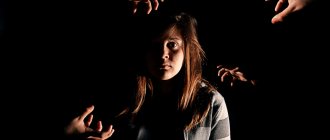No matter how tired you may be of some people, returning to an empty apartment and sitting alone with your thoughts can be scary. Many people cannot stand loneliness. According to VTsIOM, in Russia there are 46% of such people. According to BMC Public Health research, people are 80% more likely to suffer from depression if they live alone. But this does not mean that if you live on your own, you will be doomed.
Living alone is growing up, and it is both a cause and a symptom of anxiety.
– behavioral researcher Clarrisa Silva
We all enjoy spending time with our thoughts sometimes, but over time they can become negative and start to cause anxiety. Here are some ways to cope with anxiety if you live alone and are afraid of monsters under your bed at night.
Find contact with people from the past
Open your contact list on your phone and scroll through it. When was the last time you talked to this classmate? What about a good colleague from your first job? Send a couple of simple messages to the person you liked, and you would like to communicate with them, but just didn’t find the time for it. It's never too late to rekindle an old friendship, and a person from your past, especially if associated with something pleasant, is a great way to restore confidence.
How to get rid of fear
If a child is afraid to fall asleep in his crib, parents need to become more attentive to the baby.
Ask your three-year-old why he is afraid to sleep alone, what worries him. Make a daily schedule and follow it strictly. Don't fall for childish tricks.
To solve the problem, you need to eliminate the cause of fears and arrange for the baby to sleep in a separate room. Pity and laziness are inappropriate here. Staying in a separate bed without a mother, in the nursery all night, is an important stage in raising a full-fledged personality. Otherwise, your son or daughter will grow up soft-bodied, indecisive, and mumble.
Use technology
Technology and social media have completely changed the world we live in - essentially you are never alone! Use live streaming or FaceTime or Skype calls to feel how close you are with your friends with just a few swipes of your fingers. Online communication can be a great way to maintain healthy relationships with many people. Just make sure you don't replace them with real life relationships.
Good question “I was afraid to go to bed”: Girls about life with insomnia
My sleep problems started almost a year ago, after breaking up with my loved one. At first, insomnia was part of living through a stressful event. I would have meltdowns throughout the day and then go to bed emotionally drained. In bed, I continued to analyze the separation situation and look for answers to questions. I usually spent two to three hours on this mental chewing gum, and then I had a hard time falling asleep. Subsequently, I developed background anxiety throughout the day, which made it harder and harder for me to fall asleep. I could barely wake up due to fatigue, and my sleep was reduced to four to five hours a night.
In the third month, I turned to a psychotherapist - at that time it seemed to me a last resort. I took a course of cognitive behavioral psychotherapy and tried to apply the techniques that the specialist suggested to me in everyday life. They had to be changed periodically because after some time they stopped working.
A couple of months later, my condition worsened again - I began having nighttime attacks of acute anxiety. When I tried to force myself to sleep, I began to experience anxiety, tremors, uncontrollable flow of tears and attacks of suffocation. I lay on the bed, crossing my arms over my chest, silently shedding tears, looking at the ceiling. I felt a state of uncontrollable, absolute fear. I was uncomfortable in my own body. I was ready to do anything to make it stop. And it never ended. At some point I even thought about suicide because I couldn’t be in that state.
At first the attacks lasted from five to fifteen minutes, then their duration increased to half an hour. I tried to self-medicate - I took valerian and other herbal medicine, but they didn’t help me at all. When I finally managed to get out of the state of anxiety and fall asleep, I saw very disturbing dreams. As a result, my nightly sleep phase was reduced to 2-3 hours, and I practically did not rest.
For a long time I did not dare to consult a psychiatrist for fear of social condemnation, especially from loved ones. I hoped that everything would go away on its own. However, after another attack, I still decided to go to the doctor - for me it was a difficult choice.
The doctor diagnosed me with anxiety-depressive disorder and prescribed medication. I have been taking medications steadily for more than a month now - the attacks have stopped completely, I feel much better. The only thing was that at first I had to get used to the drugs: I could sleep for 15 hours, it was difficult for me to get up in the morning. Now there is no such problem anymore.
I would like to say that sleep is as important as nutrition. Under no circumstances should it be neglected. And problems with falling asleep very often indicate serious disorders of both a somatic and mental nature. You need to monitor the quality and duration of your night's sleep and under no circumstances start the problem. I now realize that I should have seen a specialist much earlier, and I'm glad I eventually did.
Keep your head busy
Don't underestimate the power of a mind that isn't busy. Your attention should not wander so that new doubts do not arise. Leave yourself clues so that when you come home there is always a book to finish reading or a new episode to read. In addition, do not avoid special exercises and training for the brain - solve puzzles!
Advice from psychologists
Recommendations from psychologists are aimed at creating a comfortable emotional environment for going to bed and overcoming fear, which is provoked by the child’s wild imagination.
Make friends with fears and monsters from dreams
Let him draw the monsters that live under his crib. Or make figures from plasticine. Play, give them names. But come up with entertainment where the monsters have positive roles.
Create a bedtime ritual
It could be a book, a lullaby or 100 kisses on the cheeks. The ritual may take a long time, but at this moment the child will receive maximum attention from you. You cannot skip the discussed method of going to bed for a single day. If the little one fell asleep in bed and came into the parent’s bedroom at night, you need to return the baby to the nursery and repeat the ritual.
Create a positive image for the night
Explain that he must sleep in a separate bed, because magic awaits him, a night fairy with a gift. In the morning, place a small surprise under your pillow.
Discuss tomorrow before going to bed
The child should fall asleep sooner so that morning comes faster. Talk about how you have a busy day tomorrow: going to the cinema, visiting, going to the playground, tasting ice cream. But in the morning, don’t give up on your plans, you need to keep your promises.
Appoint a night guard
A child's sleep near the bed can be protected by a teddy bear, soldiers, or a doll. Place the toy in the bed or next to the door. Discuss the story with your preschooler, and let him nominate his own defenders every night.
Change your child's interests in games and cartoons
You can’t just ban viewing or entertainment; you need to offer more interesting entertainment options that are safe for the psyche.
On a note! For sound sleep, the temperature in the bedroom is very important. Air heated to 18–22°C is considered comfortable. In winter, ventilate the room before going to bed, and in summer, turn on the air conditioner.
Manifestations of fear of the dark
Any of the above reasons can trigger the fear of the dark. The nyctophobe begins to experience unfounded worries that develop into panic attacks.
But the reasons for a negative reaction to darkness in adults may differ from the same manifestations in children and adolescents. Let's look at them separately.
In children and adolescents
Fear of the dark can be found quite often among children. Experts believe that this is a subconscious fear of loss of orientation and the absence of an adult.
Older children also suffer from a fear of the dark for the same reasons: they are afraid to go into a dark room, stay there alone, sleep without light sources or with closed doors.
But in adolescents, the fear of the dark is associated with other reasons: more often this fear manifests itself in those who have low self-esteem or a high level of anxiety. They may also have problems with peers, worry about this, or suffer from intrapersonal conflict.
In adults
Every tenth adult has nyctophobia. This significant indicator is due to the fact that their fear of the dark is caused by problems of the past that have not been resolved in the present.
Adults try to find all sorts of ways to overcome the fear of the dark, but if it arises unexpectedly, then the fear manifests itself in full. People want to hide, panic begins, general well-being worsens, and the imagination begins to work against the person, creating frightening images.
To combat the fear of the dark, an adult needs to have great willpower and engage in self-hypnosis or seek help from a psychologist.
Causes of fear of the dark
The fear of darkness has been inherent in man since primitive times. Then people had to constantly fear that enemies or wild animals could attack at any moment in the dark. And human vision is designed in such a way that it is tuned only to daylight.
In addition, there are other reasons for the fear of the dark (nyctophobia):
- fear that appeared and took hold since childhood - many children are afraid of the night time, most of them cope with this with an effort of will over time, and for some the fear of the dark accompanies them into adulthood;
- fear of death - in darkness and silence a person experiences a feeling of loneliness, compares it with death and therefore tries to avoid it (turns on lights, TV, music, etc.);
- fear of being alone - it causes a feeling of loss and uselessness, so you want at least someone to be nearby: a pet or even an imaginary friend;
- chronic stressful situations - prolonged stress leads to severe tension, which creates a feeling of threat from the unknown, intensifying in the dark.
If a person did not have a real reason to be afraid of the dark, then there is usually some kind of imaginary danger lurking underneath. The darkness hides the real world and the mind begins to invent its own - fantasy and frightening. In this case, it is easiest to overcome the fear of the dark.
Advice from experienced parents
The following measures will help relieve fear:
- Stay close to your kindergarten-aged child all evening. Don't take him to grandma's or to visit him after kindergarten. It is important for the baby to feel your love and receive a sufficient portion of attention.
- Buy a book to read in bed. Don't get these fairy tales during the day. Read 1-2 pages before bed.
- If a child is scared by the emptiness under the bed, place a box with books and toys there.
- Stay close until you fall asleep completely for a couple of days, then you can talk or watch TV in the next room. The main thing is that the baby feels your presence in the apartment.
- To wean yourself from sleeping with light on, buy the dimmest nightlight. Turn it on before leaving the children's room. After the baby is fast asleep, turn it off and leave the baby in the dark.
- Equip the children's room with comfortable furniture and come up with a bright, positive interior. The child must have a desire to spend the night in a separate room. You can create an intrigue in advance, a couple of weeks before moving into the nursery: tell the baby that a surprise awaits you, and redecorate the bedroom.
- Leave the nursery door open all night.
- Put the youngest child to sleep in the same room as the older ones.
A shared nursery promotes the development of friendly, trusting relationships between brothers and sisters. Older children will be more responsible and independent.
This is interesting! According to research by physiologists and psychologists, children begin to feel real fear when they develop fantasy and imagination. Boys become fearful at 3 years old, and girls at 4 years old.











